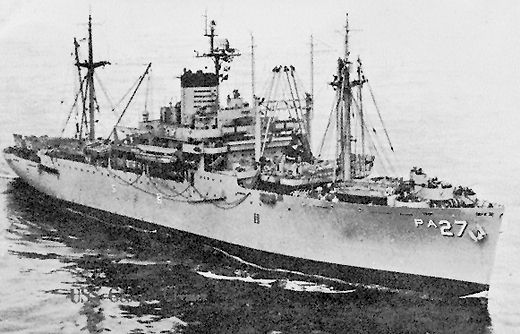History of USS George Clymer (APA-27)
|
(from the ship's Cruise Book) U.S.S. George Clymer (APA-27) is a single screw, 15,500 ton attack transport, built as S.S. African Planet by the Ingalls Shipbuilding Company at Pascagoula, Mississippi in 1941. She was built for the Maritime Commission for passenger/freighter service and was acquired from the Commission as soon as she was completed. (The merchant name can still be seen marked on her bows by weld marks.) The ship bears the name of an American Patriot who was born in Philadelphia in 1739 and died in 1813. In addition to being a signer of the Declaration of Independence and holding numerous positions in connection with the early American government, George Clymer was one of the first two Continental Treasurers in 1775. During World War II George Clymer steamed approximately 163,000 engine miles, and became the first United States Navy Attack Transport to participate in World War II operations in both the Mediterranean and the Pacific. Called the "Lucky George" (The only damage that she suffered during the war was a shell from a Moroccan shore battery which cut the main radio antenna), she dropped anchor at more than 46 ports throughout the world -- over a dozen in the United States, Hawaii, and the Canal Zone; two in the Mediterranean and 32 in the Pacific. For her final combat operation of WWII, USS George Clymer took part in the assault and occupation of the western beaches on Okinawa Island 1-5 April 1945. Clymer was then a unit of Transport Division 35; 51 officers and 1,251 troops of the Second Battalion, 29th Marines and their equipment were embarked. Upon completion of unloading at Okinawa on 5 April, the ship returned to Saipan. Clymer stopped at Eniwetok Atoll 24-25 August 1945 and then steamed on to Manila, Philippine Islands, via Ulithi. After a brief layover in the Gulf of Luzon, on the 20th she departed for occupation duties at Japan. Loaded to 125% capacity, on 1 November 1945 Clymer steamed the "Magic Carpet" duty home. By direction dated March 1946, USS George Clymer (APA-27) has remained on active duty with the U.S. Pacific Fleet. In 1950, Commanded by Captain Leonard Branneman, USN, and later by Captain Raymond L. Lamb, USN, Clymer was called into action for the Korean conflict. Soldiers, sailors, and marines from the "Lucky George" hit the beaches at Pusan, Inchon, Wonsan, and Hungnam. Since 1953, when the Korean Conflict terminated, numerous cruises to the Western Pacific have been made in support of our foreign policies as a part of the always-ready "Force of Peace" that the U.S. Seventh Fleet maintains against Communism. In August, 1965, Captain John M. Thomas, USN, relieved Captain Whitman in San Diego. Five months later, in February, 1966, the ship was again on its way to the Western Pacific, in support of our forces in Vietnam. For seven months the ship cross-crossed the South China Sea, landing supporting Marines and other U.S. Military in "faraway places with strange sounding names" - Vung Tau, Qui Nhon, Chu Lai, and An Hoi, and returned stateside in September 1966. |
